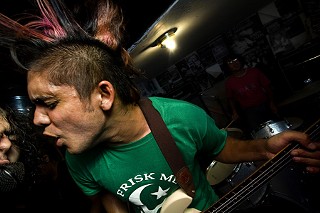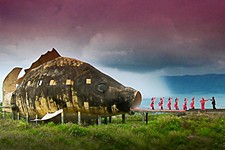Muhammad Was a Punk Rocker
How a fictional music genre blossomed into a real movement
By Marjorie Baumgarten, Fri., March 12, 2010
There is a Muslim punk rock scene in North America that goes by the name taqwacore. The term is an author's invention, a word fabricated to describe music that the author wanted to hear. The word precedes the music, the bands, and the scene. In 2002, Michael Muhammad Knight started selling photocopied versions of his novel, The Taqwacores, from the trunk of his car. Then Jello Biafra's outfit, Alternative Tentacles, published the book in 2003. Soon Mohawked Muslim punk boys and riot grrls in burquas were capturing the imagination of a new generation of North American Muslims who were coming of age in the complicated decade after 9/11. Now at South by Southwest Film '10, two films addressing this phenomenon are playing. The Taqwacores by Eyad Zahra is a fictional film of Knight's fantasy novel (Knight co-wrote the screenplay with Zahra). The other is the documentary TAQWACORE: The Birth of Punk Islam by Omar Majeed. It is a record of the Taqwa Tour, during which Majeed followed several bands as they barnstormed the American Northeast on a two-week tour and on a later visit with twirling, prodigiously hash-smoking Sufis in Lahore, Pakistan. The Chronicle spoke with Zahra and Majeed separately by phone prior to the South by Southwest debut of their films.
"Taqwa" is an Islamic term that means "God consciousness." Majeed explains that "it's the idea of being conscious of the divine in everything that you do. It's more of a spiritual, cultural idea that can be open to interpretation than a specifically Islamic idea." Knight wed this idea with hardcore punk and "came up with the name 'taqwacore' as a way of describing this fictional Muslim punk scene that he was writing about. It was a very inspiring fantasy, and the vision he wrote was very cohesive. It coalesced for other kids all the things that they were already trying to work out. It lay down a bit of a blueprint." Majeed, who first chanced on the book from a Wikipedia page on the Internet, describes his first encounter: "The description was something like, 'an engineering student moves into a house full of punk Muslims.' Those two words – 'punk Muslims' – most people scratch their heads, but for me it was more than that. Everything sort of stopped and blew my mind. I ran to the bookstore and fell in love with the book right away. I couldn't believe this was in a bookstore. These conversations! If I could have written all the things that were circling in my head growing up, they would have been very close to this book."
Knight began hearing from Muslim teens that were taken with his book. One of the most legendary contacts came from 15-year-old Kourosh Poursalehi in San Antonio, who wanted Knight to put him in touch with the bands mentioned in the book. Finally accepting the fact that the book was fiction, Poursalehi created his own taqwacore expression by taking the poem "Muhammad Was a Punk Rocker" from the book, setting it to music, putting it out under the name Vote Hezbollah, and providing an instant taqwacore anthem. Elsewhere in Boston, a punk band called the Kominas was gaining steam, and more bands were sprouting up all the time as the taqwacore idea spread among Muslim-American youth across a spectrum of sect and cultural affiliations.
It is the nature of punk rock to have a magnetic hold on teenagers. It's a reactionary music form that is opposed to the status quo, appeals to the socially alienated, and values truth and honesty. Whatever the demographic or time period – whether the punks are rebelling against Britain's Thatcherism or the American disco scene in one decade or they're riot grrls reacting to boys-club rock & roll and standards of femininity in another or subcultural groups such as Christian punks, black punks, or queercore – what they have in common is their anti-establishment identity. In the decade following 9/11, punk may hold a particular allure for Muslim-American youth struggling to establish personal identity amid the Old World values handed down by their parents and the media escalation of images of Islam as a religion of terrorists, hard-liners, and anti-Americans.
"There were so many aftershocks that came after 9/11 all over the world, particularly for Muslims in terms of how they dealt with it," says Majeed. "I think we've evolved to that point now in the aftermath of it where young Muslims need to be playing around with the very stereotypes and fear-mongering and profiling that they're receiving. That's why I have a lot of respect for Michael's book or the Kominas singing 'Suicide Bomb the Gap' or 'Sharia Law in the USA.' Because they're being provocative, but they're being provocative in a very positive way."
Zahra regards punk as "something that is never going to go away. New communities discover it and revitalize it and use it as a form to seek truth and honesty. That's the beauty of what punk does for young Muslim-Americans now. It gives them that form of expression where everything can be explored, everything can be talked about, there's no censorship; everything is open."
Although expressions of religious identity are essential to taqwacore, it would be a mistake to compare it with Christian rock. Taqwacore is not interested in proselytizing. Furthermore, it shines light on a diversity of cultural and religious beliefs. Both films speak to this diversity within Islam. Says Zahra, "This film tries to create that middle ground where you can be proud of that upbringing but at the same time you don't have to follow it literally or blindly." Majeed, too, finds the idea of diversity one of the driving elements of his documentary. "I really felt like when I found these [bands], this was the way I could get the point across. What I always felt was unfair as Islam came into the world consciousness, unfortunately through 9/11, is that Islam always gets painted with one brush. It's always the same sort of images you see of the masses bowing in unison, Mecca, the terrorist-looking guys with long beards, women in burquas. It's the quick, immediate association, and I think that's dangerous. If anything, I would like Muslims and non-Muslims to walk away from this film feeling that, no, it's never really been like that, and it's certainly not the case now. I think there's room for all kinds of ways in which people can engage with Islam, culturally or historically, loosely or with great gusto, whatever the case may be. I think, like all things, you can let it into your life to whatever degree you need it."

Another thing that seems essential to the growth of taqwacore in this decade is the concurrent growth of social networking and the online world. We have already seen the appeal of online communities for isolated-feeling teenagers who are starving for connections they can't find within their own families or localities. Taqwacore itself was a virtual idea until bands started finding one another on the Internet. Zahra's initial discovery of Knight's novel came via the Internet. Majeed, too, found the Internet to be essential to the development of his film. "These guys were forming connections, but it was in the virtual world. The challenge was always: How do we bring this out of the virtual and into the real?"
Last year at SXSW, the Kominas and other bands played a music showcase, footage of which can be glimpsed in Majeed's documentary. Now at this year's Film Festival, two films about taqwacore are on the program and a panel discussion is also scheduled for the conference. Taqwacore is no longer a hypothetical construct existing only in a novelist's head and on the written page. It has emerged from the imaginary to the actual because of the way its inherent contradictions speak to a generation of young Muslims. As a new decade approaches, taqwacore is getting discovered by rebellious citizens of all stripes, and the double whammy of films screening at this year's Festival is a testament to the scene's growing appeal.
Taqwacore: The Birth of Punk Islam
24 Beats Per Second, U.S. Premiere
Sunday, March 14, 7pm, Ritz 2
Friday, March 19, noon, G-Tech
The Taqwacores
Festival Favorites, Regional Premiere
Sunday, March 14, 4:30pm, Ritz 2
Wednesday, March 17, 3:30pm, Ritz 2
The Two Taqwacores
Panel discussion with Omar Majeed, Eyad Zahra, and Michael Muhammad Knight
Tuesday, March 16, 3:30pm, ACC 15













